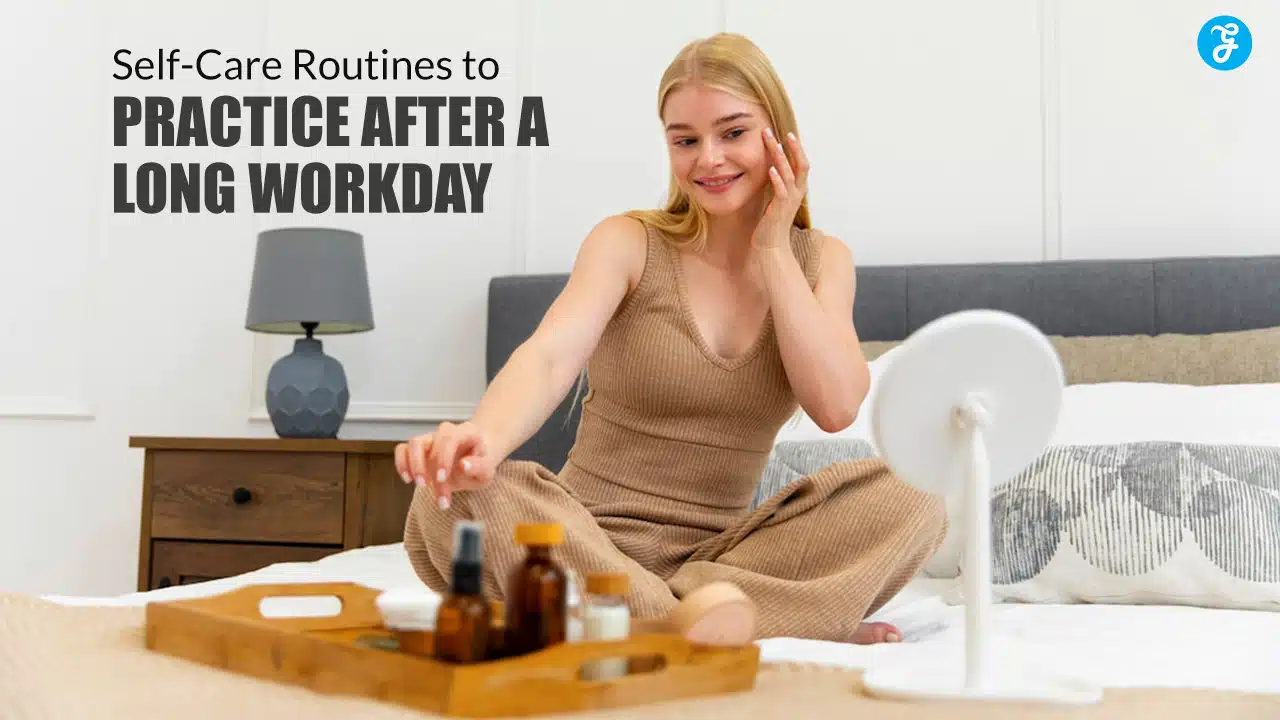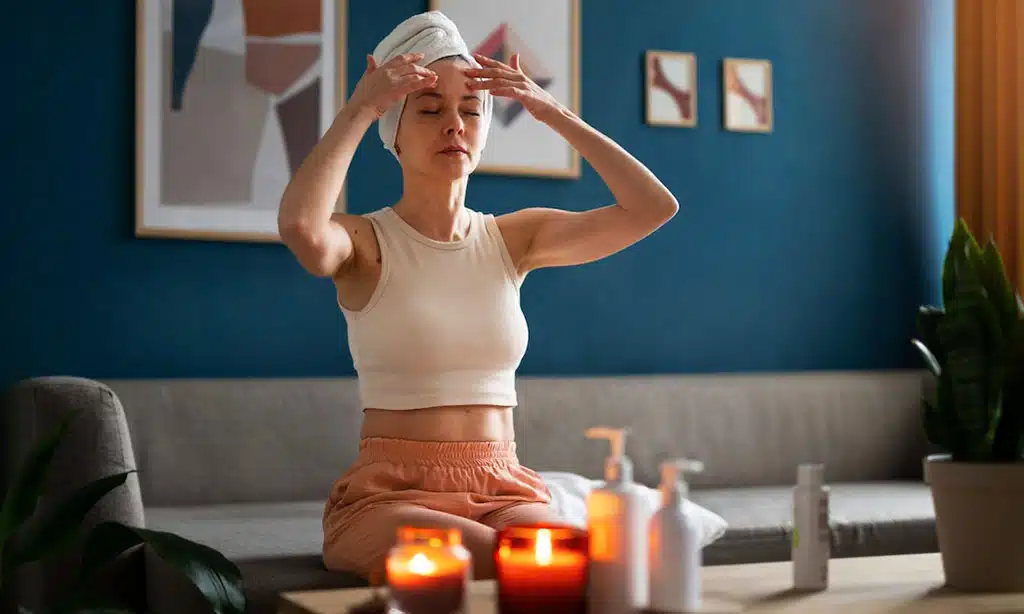After a long workday filled with meetings, deadlines, and constant activity, it’s crucial to take time to unwind, de-stress, and care for yourself.
Self-care isn’t just about pampering; it’s about nurturing your mind, body, and spirit to maintain balance and well-being. Whether you’re juggling responsibilities at home, working long hours, or dealing with the pressures of modern life, incorporating self-care routines can make all the difference in how you feel at the end of the day.
In this comprehensive guide, we’ll explore 10 self-care routines that can help you relax, recharge, and promote a sense of peace after a tiring workday.
From relaxation techniques to nourishing habits, these practices will help you feel refreshed and ready to take on the next day.
Why Self-Care After a Long Workday is Essential
Workdays can take a significant toll on both your physical and mental health. Whether it’s dealing with stressful clients, managing tight deadlines, or spending long hours sitting at a desk, your body and mind are constantly being tested.
Chronic stress from work can lead to various health issues such as headaches, fatigue, burnout, and even long-term conditions like heart disease.
Physically, extended periods of sitting or working in front of a computer can cause muscle tension, eye strain, and back pain, while mentally, work-related stress can lead to anxiety, difficulty sleeping, and emotional exhaustion.
This is why self-care is so important—it helps to reset both your body and mind, allowing you to release tension and regain energy.
How Self-Care Supports Well-Being
Self-care practices give you the opportunity to check in with yourself, reflect on your needs, and take time to focus on activities that restore balance. By engaging in self-care after a long workday, you create space to relax, unwind, and recharge your emotional and physical batteries.
The right self-care routines can:
- Reduce stress and anxiety.
- Improve your sleep quality.
- Enhance your mood and emotional resilience.
- Support better work-life balance.
- Promote overall well-being and self-awareness.
Let’s explore the 10 essential self-care routines you can practice after a long day of work.
1. Unplug and Disconnect from Work
In today’s digitally connected world, it can be difficult to truly leave work behind at the end of the day. Many people find themselves constantly checking emails, responding to messages, or thinking about tomorrow’s to-do list long after they’ve left the office.
However, unplugging from work is essential for maintaining a healthy work-life balance and giving your mind the rest it needs.
When you disconnect from work, you give yourself permission to reclaim your time and focus on the present moment. This practice allows you to mentally separate from the stresses of the workday and focus on personal time, relationships, and self-care.
How to Effectively Unplug After Work
- Turn off notifications: Silence or turn off work-related notifications on your phone and computer once your workday is over.
- Create a physical boundary: If you work from home, designate a specific area for work and avoid working from your relaxation spaces, such as the bedroom or living room.
- Set a “shutdown” ritual: At the end of your workday, create a ritual that signals the transition from work to personal time. This could be closing your laptop, going for a walk, or taking a few deep breaths.
By consciously unplugging from work, you’ll reduce stress and give your mind the space to relax.
2. Take a Relaxing Bath or Shower
One of the most effective and soothing self-care practices after a long workday is to indulge in a warm bath or shower. Warm water has therapeutic properties that help relax tense muscles, improve circulation, and calm your nervous system.
Bathing can also serve as a symbolic way to “wash away” the stress of the day and prepare your mind and body for relaxation.
A warm bath or shower not only helps ease physical tension but also reduces stress and promotes a sense of tranquility. The warm water stimulates blood flow, soothes muscle soreness, and can even help you sleep better by lowering your core body temperature.
How to Elevate Your Bath or Shower Routine
- Add essential oils like lavender or eucalyptus to your bath or shower for aromatherapy benefits that promote relaxation and reduce anxiety.
- Use Epsom salts in the bath to help relieve muscle soreness and reduce inflammation.
- Set the mood by playing calming music or lighting candles to create a peaceful ambiance.
Taking 10-20 minutes for a bath or shower can be a transformative self-care practice that leaves you feeling refreshed, relaxed, and ready for a restful evening.
3. Practice Mindful Breathing or Meditation
After a long, stressful day, your mind may still be racing with thoughts of work, tasks, and worries. Practicing mindful breathing or meditation is a powerful way to calm your mind, release stress, and regain focus.
Mindfulness involves bringing your awareness to the present moment, allowing you to disconnect from the day’s worries and focus on simply being.
Mindful breathing and meditation help activate the parasympathetic nervous system, which promotes relaxation, reduces cortisol levels, and helps regulate your body’s stress response. This practice can also improve emotional resilience, enhance focus, and boost overall mental well-being.
How to Practice Mindful Breathing and Meditation
- Start by finding a quiet, comfortable space where you won’t be disturbed.
- Close your eyes and take a few deep breaths, inhaling through your nose and exhaling through your mouth.
- Focus on your breath, noticing the sensation of the air entering and leaving your body.
- If your mind begins to wander, gently bring your attention back to your breath without judgment.
- Practice this for 5-10 minutes, gradually increasing the time as you become more comfortable.
Incorporating mindful breathing or meditation into your post-work routine will help you clear your mind, relieve stress, and promote emotional balance.
4. Engage in Gentle Physical Activity
While intense workouts may be great for overall fitness, gentle physical activity is perfect for winding down after a long day at work.
Activities like yoga, stretching, or taking a light walk can help release built-up tension in your muscles, improve circulation, and elevate your mood without overstimulating your body.
Movement releases endorphins, the body’s natural “feel-good” hormones, which help improve mood and reduce stress. Gentle physical activity also supports mental clarity, helps to relieve back or neck pain caused by sitting for long hours, and promotes relaxation.
Gentle Exercises to Try After Work
- Yoga: Focus on slow, restorative poses like child’s pose, legs up the wall, or seated forward bend to stretch and relax your muscles.
- Walking: Take a 20-minute walk in a nearby park or around your neighborhood. Walking outdoors can help clear your mind and allow you to reconnect with nature.
- Stretching: Spend 10-15 minutes stretching your body, focusing on areas that feel tight, such as your neck, shoulders, and lower back.
Incorporating gentle physical activity into your routine will help you unwind physically and mentally, leaving you refreshed and relaxed.
5. Nourish Your Body with a Healthy Meal or Snack
What you eat after a long day at work can significantly impact how you feel physically and emotionally. Choosing nutrient-dense meals or snacks will help restore your energy, balance your mood, and support overall well-being.
While it’s tempting to reach for fast food or sugary snacks when you’re tired, nourishing your body with healthy, whole foods will leave you feeling more satisfied and energized.
Healthy eating habits not only fuel your body but also support brain function, improve mood, and help regulate your sleep-wake cycle. Proper nutrition ensures that you’re replenishing the nutrients your body needs to recover from the demands of the day.
Ideas for Healthy Meals and Snacks
- Salmon with quinoa and roasted vegetables: This meal is packed with omega-3 fatty acids, protein, and antioxidants to help reduce inflammation and support brain health.
- A green smoothie: Blend spinach, banana, almond milk, and chia seeds for a nutrient-rich snack that’s light yet satisfying.
- Greek yogurt with berries and nuts: This combination provides protein, healthy fats, and antioxidants, making it a perfect snack to balance blood sugar and curb hunger.
Nourishing your body with healthy food after a long day will help you feel energized, support mental clarity, and promote overall well-being.
6. Journal or Reflect on Your Day
Journaling or reflecting on your day is a powerful way to process your thoughts and emotions after a long workday.
Writing about your experiences allows you to express any lingering frustrations, celebrate achievements, and gain clarity on any issues that may have arisen during the day.
Journaling is also a form of mental detox—it helps you release negative emotions, reduce stress, and gain insight into your thought patterns. This practice encourages self-awareness and emotional balance, allowing you to leave work behind and focus on the present moment.
How to Start a Reflection or Journaling Practice
- Set aside 10-15 minutes each evening to sit down with a notebook or digital journal.
- Start by writing about how your day went, including any challenges, successes, or emotions you experienced.
- Consider asking yourself reflective questions such as, “What did I learn today?” or “What am I grateful for?”
- Don’t worry about grammar or structure—just allow your thoughts to flow freely.
Journaling is a simple yet effective way to process your day, reduce mental clutter, and gain clarity on how to improve your work-life balance.
7. Create a Calming Evening Routine
A structured evening routine can make a significant difference in how well you transition from work to relaxation.
By establishing a consistent routine, you signal to your body and mind that it’s time to unwind, allowing you to create a sense of peace and predictability after a busy day.
Routines help your brain switch gears from work mode to relaxation mode, making it easier to release stress and focus on self-care. Whether it’s skincare, reading, or a specific relaxation technique, establishing an evening routine creates intentionality around your wind-down process.
How to Build a Calming Evening Routine
- Set a consistent time to start your evening routine each night to create structure.
- Incorporate activities that promote relaxation, such as reading a book, practicing a skincare routine, or lighting candles.
- Consider writing a short to-do list for the next day to clear your mind of any lingering tasks.
- Avoid stimulating activities like watching TV or using your phone in the hour leading up to bedtime.
A calming evening routine helps you transition smoothly from work mode to relaxation, ensuring that you wind down and sleep more peacefully.
8. Practice Gratitude or Positive Affirmations
Gratitude and positive affirmations are powerful tools for shifting your mindset and focusing on the positive aspects of your day. After a long, stressful workday, it’s easy to dwell on challenges or negative experiences.
However, practicing gratitude helps you reframe your thoughts and appreciate the things that went well.
Gratitude has been shown to improve mental health by promoting positive emotions, reducing stress, and enhancing overall well-being.
Positive affirmations, on the other hand, can boost your self-esteem and create a sense of empowerment, especially when you’re feeling overwhelmed by work pressures.
How to Incorporate Gratitude and Affirmations
- Gratitude journaling: Write down three things you’re grateful for at the end of each day, whether it’s a personal achievement, a supportive colleague, or a peaceful moment.
- Affirmations: Choose a few positive affirmations that resonate with you, such as “I am capable of handling whatever comes my way” or “I deserve rest and relaxation.”
- Express gratitude: If someone helped make your day better, consider sending them a quick thank-you message or expressing appreciation in person.
Practicing gratitude and affirmations will shift your mindset from stress and negativity to a place of positivity and self-compassion.
9. Disconnect from Screens Before Bed
One of the most important self-care practices you can implement after a long workday is disconnecting from screens, especially before bedtime.
Excessive screen time, whether it’s checking emails, scrolling social media, or watching TV, can overstimulate your brain and interfere with your ability to wind down.
The blue light emitted by screens can also disrupt your circadian rhythm, making it harder for you to fall asleep and reducing the quality of your rest.
By limiting screen time in the evening, you’ll allow your mind to relax naturally and promote better sleep hygiene.
Tips for Reducing Screen Time in the Evening
- Set a “screen curfew” and avoid using your phone, laptop, or TV at least 30-60 minutes before bed.
- Replace screen time with relaxing activities, such as reading, meditation, or journaling.
- If you must use your phone or computer, consider using a blue light filter or switching your device to “night mode” to minimize the impact on your sleep.
By reducing your evening screen time, you’ll create an environment more conducive to relaxation and restful sleep.
10. Get Enough Quality Sleep
Sleep is one of the most critical components of self-care and overall well-being. After a long day at work, ensuring that you get enough quality sleep is essential for physical recovery, mental clarity, and emotional balance.
Lack of sleep can exacerbate stress, lower your immune system, and negatively impact your mood.
Prioritizing good sleep hygiene will not only improve your health but also help you feel more refreshed, focused, and ready to tackle the challenges of the next day.
How to Improve Your Sleep Quality
- Establish a consistent sleep schedule, going to bed and waking up at the same time each day, even on weekends.
- Create a relaxing bedtime environment by keeping your room cool, dark, and quiet.
- Avoid stimulants like caffeine or alcohol before bed, as they can interfere with your ability to fall asleep.
- Consider using sleep aids like white noise machines, essential oils (such as lavender), or weighted blankets to enhance relaxation.
Prioritizing sleep as part of your self-care routine ensures that you recharge both physically and mentally after a long workday.
Takeaway: Building a Self-Care Routine That Works for You
Incorporating self-care routines into your daily life isn’t just about pampering yourself; it’s about prioritizing your well-being and creating healthy habits that allow you to unwind, de-stress, and recharge.
After a long workday, following these 10 essential self-care routines—from mindful breathing to nourishing meals—will help you achieve balance, enhance your emotional health, and improve your overall quality of life.
Remember that self-care is personal, and what works for one person may not work for another. The key is to find routines that resonate with you and fit seamlessly into your lifestyle.
Whether it’s taking a warm bath, practicing gratitude, or simply turning off your phone, these practices will help you transition from work mode to relaxation mode, ensuring that you feel refreshed and ready to face another day.




































